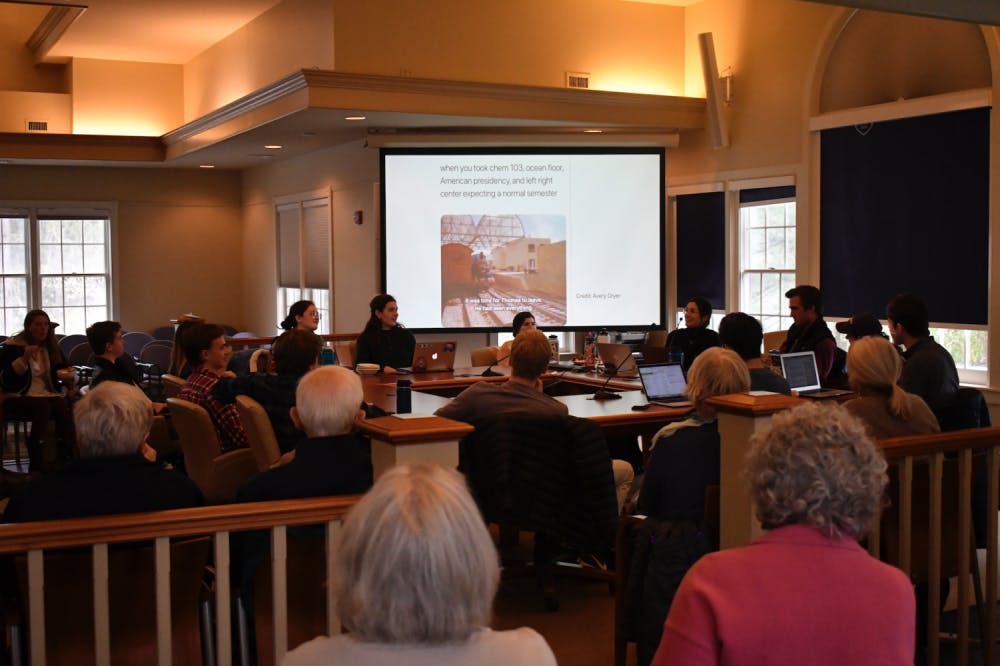Just minutes after Professor of Political Science Matthew Dickinson announced his decision to take a hiatus from his weekly politics luncheons, a group of students who regularly attend the lunches created a group message with the aim to continue them in his stead.
The luncheons, which occur every Tuesday in the Robert A. Jones ’59 House, serve as public forums for discussing recent political events in the United States that may also connect to the Middlebury community. Middlebury students and “older students,” as Dickinson has dubbed community members who attend the luncheon, have a diverse range of viewpoints about the topics, which range from controversies in Congress, to race relations, to the Trump presidency.
“The college is having a discussion on academic freedom in the classroom,” Dickinson told The Campus, regarding his decision to allow students to take over the luncheon during his hiatus.
This week, seasoned luncheon attendees Maggie Joseph ’20 and Abbott LaPrade ’21 gave a presentation entitled “Uncle Joe and the Impending Resignation of SGA.”
“I think it’s a really great place to engage in current news topics,” LaPrade said. “Overall, Dickinson has done a really good of job of making sure all views are welcome and challenged.
Joseph began by summarizing the SGA’s “Thirteen Proposals for Community Healing,” a list sent to administrators and the entire student body outlining various structural demands to college policy. Two students came with prepared statements articulating opposing arguments.
Molly Gallagher ’22 said that SGA’s proposals are representative of student concerns and that some of the proposals are culminations of long-term student considerations. Nate Blumenthal ’21.5 voiced concerns about the third demand, which requires organizations or departments that invite speakers to complete a “due diligence form” to determine if the “speaker’s beliefs align with Middlebury’s community standards.”
LaPrade then examined former Vice President Joe Biden’s recent entrance into the 2020 presidential race, his third time running for the presidency. LaPrade analyzed the age divide among support for Biden, with far more support coming from older voters than younger voters. When one student in the room questioned the ambiguity of Biden’s platform, former Governor of Vermont Jim Douglas, who was in attendance at the luncheon, responded that Biden’s campaign is based in electability.
The luncheons provide an opportunity to bridge the generational gap between college students and the older students.
“We’re there to provide an important space for discussion and the broader community who attends these luncheons,” said Joseph. “If there’s anything that these past two weeks have shown, it’s that students want to engage in tough conversations and do want a space to air their opinions. It’s a great place for mutual understanding.”
The student-led luncheon left more room for discussion, whereas Dickinson — an expert on the presidency, Congress, and presidential decision making — often lectures for a bit longer. He prepares for the luncheons the same way he does a class, researching the topics and putting together a slideshow.
“Having it conducted by peers made it feel a bit more like a conversation than Dickinson’s typical lecture-style situation,” said Abigail Judge ’21, an attendee who frequents the politics luncheons, in an email to The Campus. “I also think that there was a fun dynamic between the more elderly lunch-goers and the students today, which was cool to observe — the questions and conversations after the more formal lecture of information and charts felt really engaged among [and] between the different demographics, which I really appreciated.”
Dickinson is unsure if he will continue the politics luncheons next year, but believes they create a valuable space to engage with a wide array of opinions.
“The luncheons are an opportunity to educate students of all ages about politics,” he said. “The idea is not to tell them what to think but instead to give them the tools and a forum for making up their own minds. The luncheons provide a safe space where students with different views can engage civilly, knowing they won’t be criticized for holding a particular viewpoint, even if it is unpopular with some — perhaps even most — people.”
Dickinson Hands off Weekly Politics Lunches to Students

Comments



